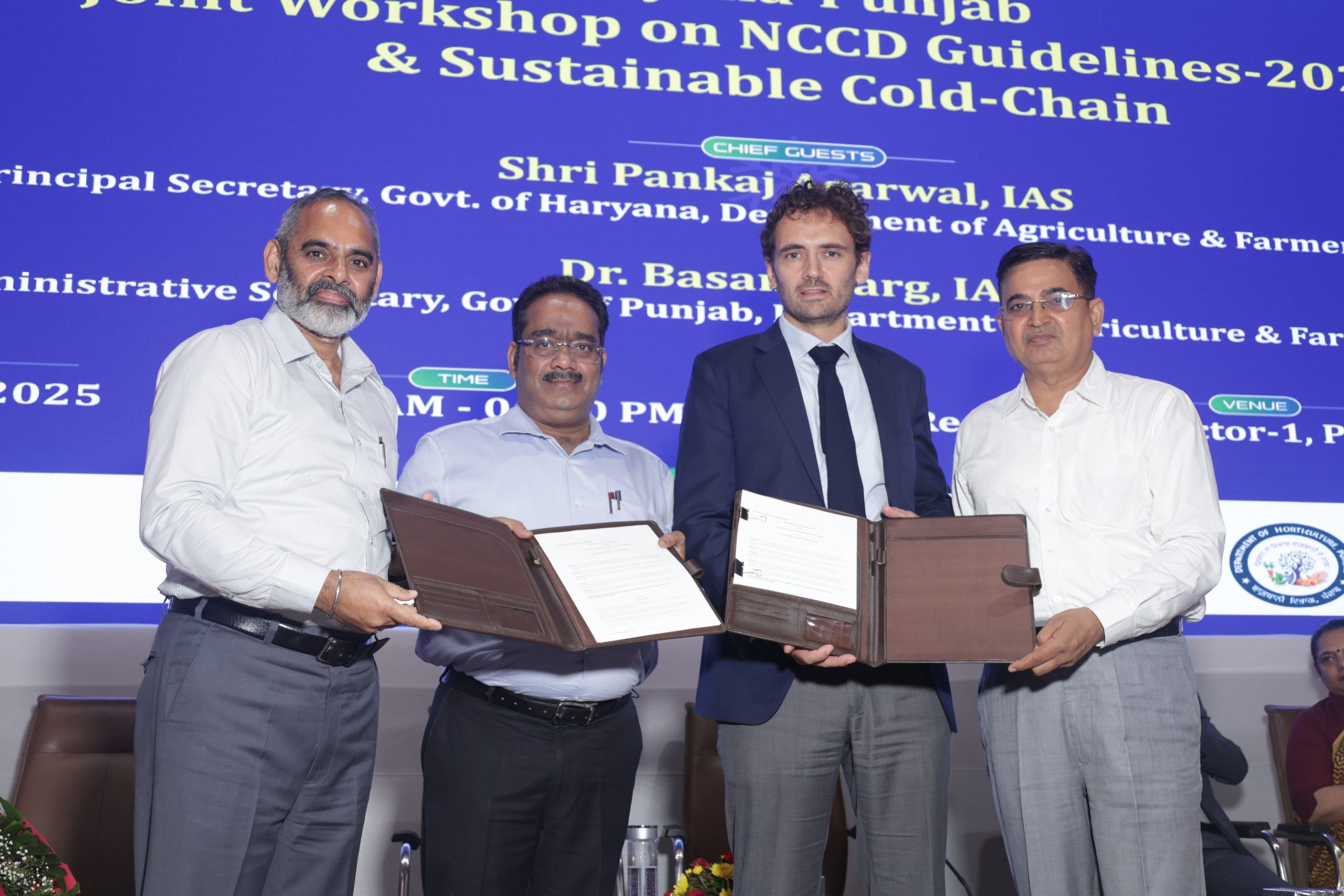UNEP Partners with Department of Horticulture, Government of Haryana to Scale up Sustainable Cold Chains in Horticulture Sector
Haryana is traditionally an agrarian society of owner-based cultivator farmers. Over half the state’s population is engaged directly or indirectly in agriculture, and about 86% of its land is arable, of which 96% is cultivated. Haryana contributes a significant 14.1% to India’s agricultural GDP, producing key horticulture crops such as potatoes, tomatoes, onions, cauliflower, citrus fruits, mangoes, and guavas.
Yet, despite this production strength, Haryana’s potential is stifled by missing links in integrated cold-chain infrastructure. Most farmers in the state are small or marginal holders dependent on daily sales. With limited access to precondition, precool and move their produce, many lose out due to post-harvest losses—estimated at 15% for fruits and 11% for vegetables. According to the National Centre for Cold-Chain Development (NCCD) Study, Haryana needs nearly 1695 packhouses, yet as of 2022, only 33 approx. existed.
Recognizing this gap, the Government of Haryana with JICA support has set ambitious targets with investment of Rs. 2700 crore (USD 320 Mill approx.) to scale up to 500+ integrated packhouses by 2033 across the state and connecting fresh produce to distant domestic and export markets.
To accelerate this effort, the Department of Horticulture, Haryana, and the United Nations Environment Programme (UNEP) have signed a new Memorandum of Understanding (MoU) on their action-focused partnership to address gaps in horticulture cold-chain infrastructure in the state through its first cold chain policy, reduced food loss and emissions, rapidly increasing energy demand for cold-chain for horticulture and associated refrigerant consumption while supporting rural communities and farmers in increasing their livelihoods. The MoU builds on UNEP’s ongoing work through the “Scaling-up Investment in Clean and Efficient Cold Chain in India” project under the UNEP Cool Coalition and delivered with Alliance for an Energy Efficient Economy (AEEE) as lead partner, and the Haryana-UK Centre of Excellence on Sustainable Crop Post-Harvest Management and Cold-Chain (CoE-SPMCC), which are complementary initiatives focused on accelerating differing aspects of sustainable cold chain development in India, with Haryana as a key priority state.
Priorities include development of integrated cold-chain facilities with market connectivity in Haryana, facilitate access to financing through state and central schemes, support Farmer Producer Organizations with first-mile packhouses, support energy-efficient and renewable energy-based technologies, skilling and capacity building for farmers and businesses, and beyond.
“There is both an economic and climate cost to inefficient cold chains,” says Balakrishna Pisupati, UNEP India Country Head. “UNEP brings global expertise, technical assistance, policy support, and innovative finance and business models to support Haryana in building cold chain systems that are both climate-friendly and economically viable. Expanding sustainable cold chains is necessary to meet several Sustainable Development Goals related to poverty reduction, food security, good health, and climate action. We’re looking at a future where even small farmers and Farmer Producer Organizations (FPOs) with State support can access clean, energy-efficient cold chain facilities without bearing unreasonable costs.”
“For Haryana, developing an organized, sustainable cold chain is essential, not just for reducing post-harvest losses but for securing better incomes and market access for our farmers,” says Dr. Arjun Singh Saini, Head of Department (Special), Horticulture, Haryana. “This partnership with UNEP is about enabling farmers to adopt modern technologies, access new markets, and benefit from sustainable, climate-friendly practices. By strengthening our horticulture value chain, we aim to create long-term livelihood benefits for Haryana’s farmers while contributing to India’s broader climate and development goals.”
Echoing this, Shri Pankaj Aggarwal, IAS, Principal Secretary, Department of Agriculture & Farmers Welfare, Haryana, adds: “For Haryana, an efficient cold chain is not just about storage; it’s about efficiently moving fresh produce to markets and protecting the value of our farmers’ produce and ensuring stability in their livelihoods. Most of our farmers are smallholders who need reliable, accessible facilities like packhouses near their farms. Through this collaboration with UNEP, Haryana is working to build a modern, inclusive cold chain ecosystem that addresses climate challenges while strengthening rural incomes and setting an example for other states.”
The MoU signing was followed by a workshop on sustainable cold chain solutions and implementation, bringing together key partners. Attended by technical officials from the horticulture departments of Haryana and Punjab, as well as cold-chain business owners, the workshop featured technical sessions on revised NCCD guidelines-2025, packhouse design and technology, post-harvest management, and best practices for energy-efficient horticulture cold chains.
By aligning UNEP and partners’ cold chain expertise with Haryana’s state-level priorities, the MOU facilitates a collaborative platform for technical support, policy development, financial facilitation, and capacity building. It moves beyond fragmented efforts towards system-wide transformation, positioning Haryana as a national demonstration site following a systems approach for how organized, sustainable cold chains can simultaneously boost farmer incomes, reduce food loss, and contribute to India’s climate action goals.

